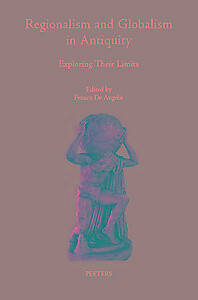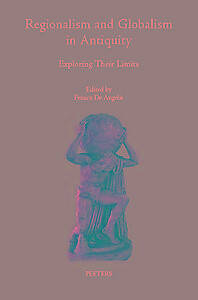
- Afhalen na 1 uur in een winkel met voorraad
- Gratis thuislevering in België vanaf € 30
- Ruim aanbod met 7 miljoen producten
- Afhalen na 1 uur in een winkel met voorraad
- Gratis thuislevering in België vanaf € 30
- Ruim aanbod met 7 miljoen producten
Zoeken
Regionalism and Globalism in Antiquity
Exploring Their Limits
€ 159,95
+ 319 punten
Omschrijving
How we concieve of the movement of ancient phenomena through time and space has been undergoing reassessment over the last two decades, causing the grip to be loosened on the well-entrenched interpretative models that had dominated research up to that point. The 'Regionalism and Globalism in Antiquity' conference, held in Vancouver on March 16-17, 2007, aimed to take stock of this situation and in particular to investigate in fresh ways how regional and global phenomena in the ancient Mediterranean, Near East and Eurasia shaped local life. Still today two models tend to guide explanations of intercultural and interregional contact and interaction: diffusionism from cores (or centres) to peripheries, involving 'superior' civilisations influencing other 'inferior' ones, and Mediterraneanism, the set of distinctive environmental, cultural and historical images that create a unified and unchanging view of the Mediterranean. These two models have come under increasing scrunity since the 1980s, as we have been living in a world of shifting perceptions of time and space and of greater interconnectedness that affects our everyday lives in numerous ways. The source of these shifts has been credited to globalisation, and with it has also come a greater historical appreciation of the phenomenon, including the recognition that the world has witnessed periods of globalisation since the end of the Ice Age. This volume contains 14 reworked and peer-reviewed essays from the original conference proceedings and provides a fair overview of the various chronological periods, methods and data, and perspectives encountered at the conference. The essays consist of case studies whose subjects range in date from the 10th millennium BC to the 4th century AD and draw in all the major regions of the ancient world. These essays and the original conference from which they derive have by no means exhausted all the potential topics raised by the framework within which they work. Much work remains to be done for antiquity and, given the framework's wide applicability, later periods of history.
Specificaties
Betrokkenen
- Uitgeverij:
Inhoud
- Aantal bladzijden:
- 362
- Taal:
- Engels
- Reeks:
- Reeksnummer:
- nr. 7
Eigenschappen
- Productcode (EAN):
- 9789042926691
- Verschijningsdatum:
- 16/05/2013
- Uitvoering:
- Hardcover
- Formaat:
- Genaaid
- Afmetingen:
- 164 mm x 248 mm
- Gewicht:
- 830 g

Alleen bij Standaard Boekhandel
+ 319 punten op je klantenkaart van Standaard Boekhandel
Beoordelingen
We publiceren alleen reviews die voldoen aan de voorwaarden voor reviews. Bekijk onze voorwaarden voor reviews.







